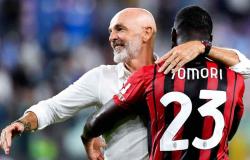Forty-two years ago it was staged on the track of Imola the 1982 edition of the San Marino GPwhich went down in history for internal battle among the Ferraris of Didier Pironi (race winner) And Gilles Villeneuve, second at the checkered flag. An episode that would have unleashed the ire of the Canadian driver towards his partner, with the fate that he would have played the role of mocking him only two weeks later in Zolder.
That ambiguous “slow” sign
The boycott of the FOCA stables had brought to Santerno a race valid for the reduced-ranked F1 Championship. Despite this, the GP had taken an interesting turn, especially in terms of the leading positions. Villeneuve had taken the lead from René Arnoux on lap 27. Four laps later, Arnoux and Pironi had overtaken him, following in his wake towards the Tosa.
On lap 41 Villeneuve overtook Pironi again at Tosa, regaining second place. At the same time, Arnoux’s Renault engine had caught fire, forcing the Frenchman to retire. From the Ferrari pit wall, given the easy one-two in sight, as a precaution (the cars broke easily…) an ambiguous sign had been displayed “slow”: to slow down the pace or to… maintain positions?
Misunderstandings and betrayals
What exactly the Ferrari wall meant with this message will remain a topic of discussion for eternity.
Certainly, Villeneuve had interpreted it as a freezing and maintaining positions. Pironi, however, had a completely different opinion. From that point on, the race between the two Ferrari drivers became a rustic duel, from which Gilles emerged defeated by being overtaken at the last minute by Tosa.
“It never occurred to me to cover the line…stupid, right?”
The Canadian was in a terrible mood immediately after the race and certainly didn’t send word. Convinced that he had been cheated out of victory, betrayed by someone he thought was a friend, Villeneuve left Imola with the intention of never speaking to Pironi again. And to put things right on the track, starting with the next race, which would have been in Zolder.
Unanswered questions
Unfortunately we cannot change the course of history, just as we cannot know what goes on in a person’s head or the reasons for certain choices. Especially if the people to whom you ask these questions have passed away, and time has not had the opportunity to smooth out certain rough edges.
According to some retrospective readings, the poisoned climate led Gilles to take an unnecessary risk, which will prove fatal, in the following GP. But did it really happen like this? Who can assure that the Aviator, without the episode of Imolawouldn’t he have attempted the same maneuver, driven by the generous nature of always going to the maximum with any means at his disposal?
Didier had he really broken an agreement between the drivers, disobeyed a team order, or had he rather indulged the nature of a driver, the one that pushes certain people to risk their lives in order to always aim for first place? In the surreal aftermath of the race, the Frenchman declared:
“For once, I think that my victory isn’t terribly unfair. I understand Villeneuve’s disappointment, but he cannot be angry with me, excellent working relationships and friendships have always existed between us. It’s a success for the team and it must please him too.”
Ferrari’s non-role
It seems that in a clarification between Enzo Ferrari and Gilles Villeneuve, requested by the latter to feel a support within the team after the Imola race, Drake had actually referred to the cherished concept according to which the victory of the car is important, regardless of the driver who drives it. Poisoning the atmosphere even more.
After all, how can you blame Drake? TO Imola 1982, Ferrari scored the 27th double in its history. Result gained due to a certain superiority on the track, perhaps not well supported by the pit wall which, without Mauro Forghieri at the helm, he had instructed his pilots with a cryptic signal.
Marco Piccinini, DT at Imola, declared after the race:
“I think it’s natural that Didier tried to take first place. If there is an aftermath in the conflicts between the two drivers we will try to overcome it.”
“If” and “but”
Unfortunately there would not have been time to overcome the aftermath of the conflicts, fate would have arranged differently.
If Imola 1982 had not been the scene of this fratricidal duel, how would history have changed? Ferrari in 1982, moreover, had the single-seater and the potential to take home both the Drivers’ World Championship and the Constructors’ World Championship.
The single-seaters, however, were too dangerous. Assuming and not granting that Imola actually served as a prologue to Zolder, would “everything have gone smoothly”? Pironi’s accident at Hockenheim, the propensity for take-offs with out-of-control flights, combined with the fragility of the cars: everything suggests a “no”.
Certainly, the ease with which the 126 C2s built a competitive advantage over the competition would have represented the right basis with which to take home the title. It matters little, however: unfortunately, history is not written with “ifs” and “buts”. Not even in Formula 1.
Luca Colombo





